The Chatham Arts Council is investing in artists through our Meet This Artist series, introducing you to 12 Chatham County artists each year in a big way.
The fine folks at Hobbs Architects in downtown Pittsboro are powering our Meet This Artist series this year. Architecture is art, and the Hobbs crew values art in our community.
Take a look. Meet your very inspiring neighbors. Meet This Artist.
Tell me about yourself and how you got your start in music.
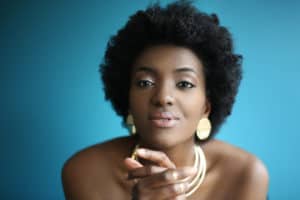 I am a singer-songwriter (singing under the name Deja Belle) from Washington D.C. That’s basically where my musical roots started, as far as pursuing an indie music career. I’ve been in performing arts ever since I was 12 years old. When I first got exposed to the stage, I was doing step dance and my own poetry at the time. I fell in love with Langston Hughes’ and Maya Angelou’s poetry. It gave me such a sense of Black identity when I read their poetry. I remember a lot of the first poems that I wrote were very much along those lines. They talk a lot about Black pride, being a woman, and just having pride and confidence in being a young woman at the time, but exploring those two identities.
I am a singer-songwriter (singing under the name Deja Belle) from Washington D.C. That’s basically where my musical roots started, as far as pursuing an indie music career. I’ve been in performing arts ever since I was 12 years old. When I first got exposed to the stage, I was doing step dance and my own poetry at the time. I fell in love with Langston Hughes’ and Maya Angelou’s poetry. It gave me such a sense of Black identity when I read their poetry. I remember a lot of the first poems that I wrote were very much along those lines. They talk a lot about Black pride, being a woman, and just having pride and confidence in being a young woman at the time, but exploring those two identities.
When I got on stage, I never wanted to leave. Going into high school, I continued to step dance and compete regionally. I’m grateful that I went to the high school that I did go to because the after school programs were so robust. I just put myself in anything and everything I could to just stay active after school because I really did love to entertain. I just loved to do whatever. We had a number of productions throughout the year. One that really sticks out is International Night.
I grew up in Silver Spring, Maryland, which is on the outskirts of Washington, D.C. It’s so diverse there, in terms of the number of ethnic groups and countries that are represented. Being a first-generation immigrant is also a huge part of my identity. It was definitely fostered and nurtured there because everybody was from somewhere else. In Silver Spring, when someone asks you where you’re from, you tell them what country your parents are from. Nobody cares where you were born or where you were raised; everybody wants to know where your family is actually from. There was a lot of exposure to culture, music, dance, and food in Silver Spring. It’s a unique place.
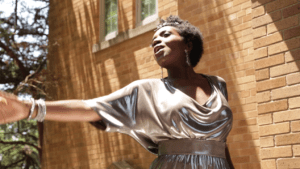 I continued doing dance and poetry for years, and singing was probably the last art form that I started performing in public. I was actually very shy about singing because I felt like my voice didn’t sound like anyone else’s. I didn’t sound like Whitney Houston or Mariah Carey. Those are the big names I grew up listening to. Even when R&B and hip hop became more popular, I still felt like I didn’t sound like anyone. It wasn’t until I was in my teens when I started hearing a new sound from a genre called “neo soul,” with artists like Erykah Badu and Lauryn Hill. Neo soul is like R&B mixed with jazz elements; their voices are more jazzy than church-like. It was just different, and it really started to resonate with me. I think that’s when I started thinking, “Wow, I’d love to do that.” But I still wouldn’t sing much in public. It wasn’t until I was in my twenties and out of college that I finally got the courage to let my parents know that I didn’t want to be the quintessential lawyer or a doctor that many Africans who come to America dream of for their children, and that I actually wanted to at least try to pursue music.
I continued doing dance and poetry for years, and singing was probably the last art form that I started performing in public. I was actually very shy about singing because I felt like my voice didn’t sound like anyone else’s. I didn’t sound like Whitney Houston or Mariah Carey. Those are the big names I grew up listening to. Even when R&B and hip hop became more popular, I still felt like I didn’t sound like anyone. It wasn’t until I was in my teens when I started hearing a new sound from a genre called “neo soul,” with artists like Erykah Badu and Lauryn Hill. Neo soul is like R&B mixed with jazz elements; their voices are more jazzy than church-like. It was just different, and it really started to resonate with me. I think that’s when I started thinking, “Wow, I’d love to do that.” But I still wouldn’t sing much in public. It wasn’t until I was in my twenties and out of college that I finally got the courage to let my parents know that I didn’t want to be the quintessential lawyer or a doctor that many Africans who come to America dream of for their children, and that I actually wanted to at least try to pursue music.
In high school, I started turning my poems into songs, but I wasn’t sharing them with anyone. As I got older, I started exploring song form and writing more. I had a bunch of songs, and it just got to a point where performing my original music was almost an itch I had to scratch. Thankfully I was in DC at the time, where the underground soul scene is robust. You can just walk down U street, which is a very famous corridor for music, to hear and play some great music.
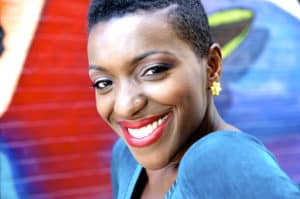 I just had to get these songs out. I bought a guitar, taught myself only three chords, and was like, “OK, that’s it, I got it.” So I went out there, started performing, and started meeting musicians who would say, “You know, you have a great sound, and I like your song writing, but how about I play guitar for you?” That’s where it started. That was 2006 in DC.
I just had to get these songs out. I bought a guitar, taught myself only three chords, and was like, “OK, that’s it, I got it.” So I went out there, started performing, and started meeting musicians who would say, “You know, you have a great sound, and I like your song writing, but how about I play guitar for you?” That’s where it started. That was 2006 in DC.
I never thought about being mainstream. I just wanted to have as much control over my look as I could because I wanted to look a certain way, intentionally. I want to make sure that I was uplifting natural Black beauty, with my hair and my complexion. I never wanted that to be compromised. I just went out there as an indie artist, starting at the open mics. When you’re in that circuit, you meet other musicians, and you start connecting with them and building with them. That’s how I met my husband, Matthew McCaskill, who produces under the name Matty the Chef.
When I met him, he was a singer, a songwriter, and he played guitar. He had all of these beautiful ballads that he’d written on guitar. So in my mind, I was like, “Oh man, we’re going to do this together.” And I promise you, the second we got together, he dropped the guitar. It was never his thing. He’s a percussionist, an amazing composer, and producer. Those are the areas where he shines. When we started working together in 2007, he took a back seat in our group and started cultivating my sound. He never really wanted to be a husband and wife duo who performs together. He likes to be behind the scenes, which is great. He’s excellent in developing artists and developing sound. He’s a musical genius, and I’m the lyrical one of the group. I’ve been doing poetry and writing forever. He brings such a wealth of knowledge of music in general. When I met him, he put me onto Afro-Cuban music, music from Black Panamanians, and music from all these other places in the African Diaspora. He was familiar with some music from Africa, but I was able to share a part of my culture because I grew up listening to rumba and soukous music from the Congo. We’ve been working together ever since.
Do you come from a musical family?
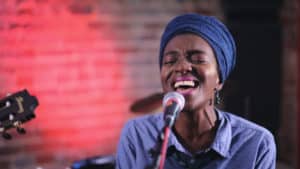 My mom was tone deaf! She loved to praise and worship, but she did it tone deaf. It’s my father who’s the musical one. He instilled it in me whether he realized it or not. When I was a young girl, my father was part of a cover band, playing soukous and rumba music from the Congo. I remember going to those rehearsals in the basement of a bar in DC. His voice is just beautiful. That’s where it comes from. He just loved music. Growing up in the 90s, he collected every music video tape that came out of the Congo. Our family nights were watching the videos and emulating the dances. We knew all the songs. He cultivated a rich love for music in me and my siblings.
My mom was tone deaf! She loved to praise and worship, but she did it tone deaf. It’s my father who’s the musical one. He instilled it in me whether he realized it or not. When I was a young girl, my father was part of a cover band, playing soukous and rumba music from the Congo. I remember going to those rehearsals in the basement of a bar in DC. His voice is just beautiful. That’s where it comes from. He just loved music. Growing up in the 90s, he collected every music video tape that came out of the Congo. Our family nights were watching the videos and emulating the dances. We knew all the songs. He cultivated a rich love for music in me and my siblings.
Is your daughter musical?
She is very musical but she’s not classically trained in any way. My husband and I have talked about whether or not to put her in classes because he’s self taught and believes that’s the best way to learn. So we have a very hands off approach. For her, honestly, it’s worked because we’ve just had the piano around and it’s not forced. We don’t make her practice or anything, but she does, and has written songs already and is teaching herself chords. She kind of does it all. She just loves music. I don’t think she really had a choice — it’s been all around her since she was a baby.
How did you find your way to North Carolina?
I just put my finger on a map with my eyes closed because it was time to get out of DC. Well, that’s not exactly how it happened, but close. We were thinking about getting out of the city, finding someplace that offered a slower pace of life. We thought about a number of states, and in the end, North Carolina seemed to make the most sense. We thought we’d start by just moving down South. We actually started out in High Point because it was affordable, but I’m really glad we’re here in Pittsboro now.
How did you end up in Pittsboro from High Point?
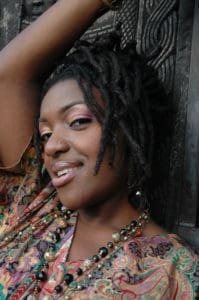 When I was on a Black farmers’ tour, I met a farmer who told me I should come check out Pittsboro. We were still in High Point at the time, but you know, High Point doesn’t really have a feel or vibe, but Pittsboro definitely does. I was pleasantly surprised by how progressive and artsy it is. I’m just blown away by the talent. We’ve met people who do solar energy, people who know how to build really cool houses, and people who build beautiful pollinator gardens. People just seem to be aware about sustainability on one level or another, whether they’re growing food, flowers, or building houses.
When I was on a Black farmers’ tour, I met a farmer who told me I should come check out Pittsboro. We were still in High Point at the time, but you know, High Point doesn’t really have a feel or vibe, but Pittsboro definitely does. I was pleasantly surprised by how progressive and artsy it is. I’m just blown away by the talent. We’ve met people who do solar energy, people who know how to build really cool houses, and people who build beautiful pollinator gardens. People just seem to be aware about sustainability on one level or another, whether they’re growing food, flowers, or building houses.
I was already homeschooling our daughter when we got here, but I got tapped into this beautiful homeschool community that I didn’t have access to in High Point. It’s very inclusive. In High Point, there’s definitely a strong homeschool community, but it’s very homogenized, and I just didn’t feel welcome. It’s not like that at all here.
I saw you had an album out last year. Tell me how that came to be.
My producer was like, “You need to release something NOW.” I really suffer from paralysis through analysis. We had been working on music for years, and there are actually still a lot of songs that didn’t make the album. We had so much music, but I just was nervous about finally releasing this body of work. It’s never perfect. As an artist, you have to get to a point where you are okay with it being really good, not perfect. Good for where you are right now.
So I thought to myself, “Okay, I can do this. I can let my baby go.” We looked at all the songs that we had been working on and just thought about what we felt was really good, what we felt was really relevant, and what sounded like it had some synergy, meaning you can listen to the whole album from beginning to end. We ended up with seven full songs on the EP.
What is your song writing process like?
A lot of times, my husband may have instrumentation that he’s worked out, which will inspire me to start writing. He’s then inspired by my writing, and revises it again. So there’s this constant dance of perfecting and finalizing the song. Eventually it gets to a point where we’ll feel it’s time to let it breathe, let other people experience it, and see how they feel. You just have to let it go. That can be so hard as an artist sometimes.
What’s the experience been like since the album came out? Have you gotten a lot of feedback?
The best reception that I got, which was surprising, was from London. I was not expecting that. I did know that in the UK, there’s this love for soul music. They just love soul music—old soul, new soul, everything. When my album came out, the response from the people in the UK was very humbling, flattering, and surprising. I actually charted on a couple of their indie soul charts.
Who inspires you, both musically and in your poetry?
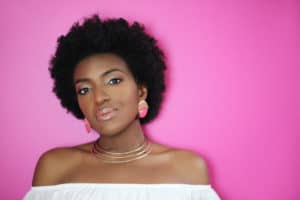 I have so many influences, but I’ll say Lauryn Hill and Erykah Badu are at the top of the list. As I started listening to them and hearing their covers of certain songs, I started doing research. I discovered Roberta Flack, Chaka Khan, Billie Holiday, and all of these amazing women from the 60s and even earlier. My parents’ soul music was rumba. So that’s all I knew of 60’s music. I wanted to learn about Black soul music because that inspired my idols and because, in the 90s, sampling songs was a huge thing in hip hop soul. Some people love it, some hate it. What sampling really did for me was open me up to a lot of soul music I didn’t grow up with.
I have so many influences, but I’ll say Lauryn Hill and Erykah Badu are at the top of the list. As I started listening to them and hearing their covers of certain songs, I started doing research. I discovered Roberta Flack, Chaka Khan, Billie Holiday, and all of these amazing women from the 60s and even earlier. My parents’ soul music was rumba. So that’s all I knew of 60’s music. I wanted to learn about Black soul music because that inspired my idols and because, in the 90s, sampling songs was a huge thing in hip hop soul. Some people love it, some hate it. What sampling really did for me was open me up to a lot of soul music I didn’t grow up with.
As far as my writing style goes, it’s very anecdotal. Jill Scott inspired me. I was 17 when her album came out, and that’s when the light bulb went off because she sang and did poetry on one album.
Do you feel like your writing has evolved over the years?
Absolutely. I’m an artist, but there’s still a lot of me that I feel like I keep to myself. For the next project, I want to push myself to be more vulnerable. I like to be upbeat and as positive as possible in my music, but there’s really been some heavy stuff going on, both in my personal life and in the world. I just feel like it’s a great opportunity for me to explore heavier topics. It’s really not comfortable for me. I’m still healing from the loss of my mother this year. A lot of the songs that I’ve birthed in the last year have been more like healing songs.
What have you been doing since the pandemic began back in March? How have things changed for you?
At first I wasn’t intentionally working on any projects–I just wanted to have fun in the studio again. So I started working on harmony ideas, laying down vocals, and covering songs that just make me happy. The interesting thing with COVID is that in a weird way, it’s reconnected me with my artist friends in DC. So now I’m working on a couple of collaborations, and they’re all remote. Each artist records themselves performing the song and the audio visual folks will put all of the snippets of the videos together. They’ve done it for a few other musicians, and the videos are really cool. They’re very dynamic.
What’s next for you?
What I would love to do is just start performing, especially in North Carolina. I really have this deep desire to perform again. It’s what I miss the most. I have a huge repertoire of musicians and a network in DC that I just don’t have here. Moving here and launching the album here has made me feel like I’m starting anew. It’s a new state, a new city, and a new audience, which is good, but challenging.
I also want to work on being more of a teaching artist, likely online. I just started exploring what that would look like. I can see myself teaching songwriting to kids, and I’ve been thinking about teaching adults how to heal through songwriting. I just feel that given the time that we’re in right now, it would be good to use creativity to express yourself when you feel oppressed, depressed or frustrated or whatever emotion you’re going through. Music can be very healing.
For more information about Edith’s music, visit her website at https://dejabelle.bandcamp.com/.
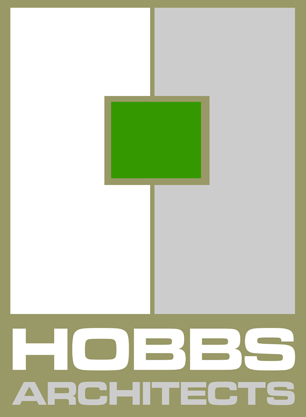
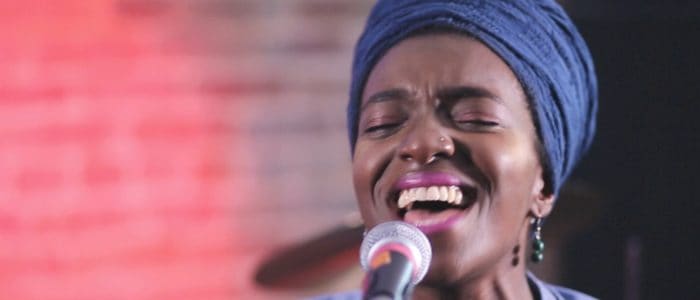


Leave a Reply